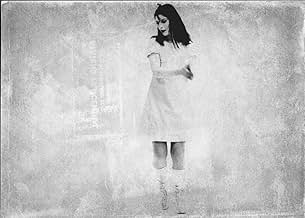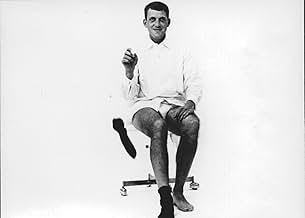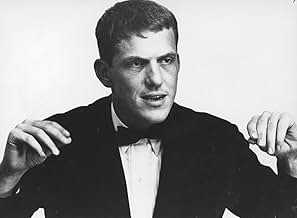Det perfekte menneske
- 1968
- 13m
IMDb RATING
7.2/10
2.6K
YOUR RATING
An elegant and humorous film-in the guise of a serious anthropological treatise-spotlights "The Perfect Human," a model of the modern Dane created by our wishful thinking.An elegant and humorous film-in the guise of a serious anthropological treatise-spotlights "The Perfect Human," a model of the modern Dane created by our wishful thinking.An elegant and humorous film-in the guise of a serious anthropological treatise-spotlights "The Perfect Human," a model of the modern Dane created by our wishful thinking.
- Director
- Writers
- Stars
Majken Algren Nielsen
- The Perfect Woman
- (as Maiken Algren)
Jørgen Leth
- Speaker
- (voice)
- (uncredited)
- Director
- Writers
- All cast & crew
- Production, box office & more at IMDbPro
Featured reviews
This is an interesting little movie. It explores the concept of "the perfect human" through close studies of a "perfect" male and a "perfect" female. The movie asks a lot of questions but does not try to answer them. I don't feel like I fully understood the picture and it felt a bit too artistic for its own good. I chose to view it as an attempt to ridicule our conceptions of what it means to be "perfect". Some scenes were outright funny, while others were just confusing (especially in the shaving sequence). This movie is essential viewing if one plans to see Lars Von Triers "The Five Obstacles" which is a very good documentary where the director, Jørgen Leth gets to re-make his short movie 5 times but under different, more difficult circumstances. As entertainment I rate it slightly above average. As art? I don't know.
At first moment when I turned on this film, I didn't had any idea of what to expect, Even though I did heard about it (that's I watched it at the first place). But after I watched it, I was kinda stunned of the artistic visualization of this movie. It is beautiful, simply. Many people might not like it as many won't understand it, but if you can, Do watch this movie. It is a reflection of pressure from the society and others to a person for the idea of 'The Perfect Human', which is according to me, completely irrelevant. The ideas like 'The Perfect Human', 'The Idol Band', etc. are just sentences, and thus not an statement, ideas like this might be right for one, and wrong for the other. Your idea for the perfect life for a person, might not be right according to that person itself. This movie beautifully represents such statement for the 'The Perfect Human' part.
Shot in beautiful, bright, black & white, Jørgen Leth's The Perfect Man, although literally "the perfect human begin" (which makes more sense since there's also a woman in it) is one of the most perplexing and unique short films ever made. While short films are usually played for laughs or a punch line, Det perfekte menneske is more interested in aesthetics than making a point. The film doesn't have a narrative in a strict sense, but simply presents us with mundane activities and facts revolving around the perfect human being. Adding a layer of mystery and surreal, the perfect human himself directly addresses his audience telling us about a weird incident that happened to him. Although we don't get what he really means, at the end of the film he explains that we will understand "in a few days".
While I'm not sure we can ever understand what it means; the film has an incredible staying power, especially if you like a good riddle à la David Lynch. Det perfekte menneske (I love how that sounds in Danish) is a good example of social commentary, without being pretentious or preachy. It presents us with "facts" and leaves the viewer the interpretation of a larger meaning, even though its author certainly had its own vision and ideas when he made the film. The tranquil and soothing clarinet music, helps creating a distinct atmosphere and puts you almost in the mindset of a "brainwashing" video. In fact the whole film is very clinical in its analysis of the perfect man. The director becomes like a doctor treating a patient, his character. The empty, white rooms, the minimalist set design and the bright lighting help creating the atmosphere of a hospital or even insane asylum, where the routines of everyday life are exposed for their meaninglessness.
I first saw this short film in the context of Lars von Trier's Five Obstructions (2003) in which he challenges Jørgen Leth to remake his own film. Ever since watching that excellent documentary, I was occasionally reminded of this short film and felt the need to re-visit it. What I appreciate most about it is its simplicity. It is a stunning work of art and yet it's about nothing in particular. It manages to be entertaining without a plot. It is about everything – the whole human experience – while appearing to be about nothing, on the surface. It can be viewed in different cultural contexts and time frames, re-interpreted, discussed and quoted. I like to quote it, although I haven't met anyone that got the reference yet, but I have a great affinity for Danish humor. Growing up in a German-speaking area, I can see many similarities in the language and culture – I am always fascinated with the typically Scandinavian quirks.
While I'm not sure we can ever understand what it means; the film has an incredible staying power, especially if you like a good riddle à la David Lynch. Det perfekte menneske (I love how that sounds in Danish) is a good example of social commentary, without being pretentious or preachy. It presents us with "facts" and leaves the viewer the interpretation of a larger meaning, even though its author certainly had its own vision and ideas when he made the film. The tranquil and soothing clarinet music, helps creating a distinct atmosphere and puts you almost in the mindset of a "brainwashing" video. In fact the whole film is very clinical in its analysis of the perfect man. The director becomes like a doctor treating a patient, his character. The empty, white rooms, the minimalist set design and the bright lighting help creating the atmosphere of a hospital or even insane asylum, where the routines of everyday life are exposed for their meaninglessness.
I first saw this short film in the context of Lars von Trier's Five Obstructions (2003) in which he challenges Jørgen Leth to remake his own film. Ever since watching that excellent documentary, I was occasionally reminded of this short film and felt the need to re-visit it. What I appreciate most about it is its simplicity. It is a stunning work of art and yet it's about nothing in particular. It manages to be entertaining without a plot. It is about everything – the whole human experience – while appearing to be about nothing, on the surface. It can be viewed in different cultural contexts and time frames, re-interpreted, discussed and quoted. I like to quote it, although I haven't met anyone that got the reference yet, but I have a great affinity for Danish humor. Growing up in a German-speaking area, I can see many similarities in the language and culture – I am always fascinated with the typically Scandinavian quirks.
At first I did not know what to make of this film. I was disappointed, but it felt like I had probably missed something, like there must be some underlying message which I was most likely not interpreting correctly. I spent days trying to figure it out, and then I realized it: both critics who say this film is boring and a waste of time, and those who say it is an entertaining depiction of our human nature have missed the point.
The perfect human, as shown in it's true form in this "documentary", has no responsibilities, no space, no time and no subjectivity at all; the perfect human only knows his own needs (sleeping, eating, making love), he is constantly idle, alienated and empty. The perfect human is a profoundly uninteresting creature. From this perspective, the apparent pointlessness of the film is precisely the point which the film is trying to make: that perfection is dull, silly and undesirable. It portrays our human nature by reaching inside us as viewers (and not by leading us inside the characters of the film) and making us feel estranged from our own dynamic reality - the imperfect reality that actually makes us perfectly humans.
The perfect human, as shown in it's true form in this "documentary", has no responsibilities, no space, no time and no subjectivity at all; the perfect human only knows his own needs (sleeping, eating, making love), he is constantly idle, alienated and empty. The perfect human is a profoundly uninteresting creature. From this perspective, the apparent pointlessness of the film is precisely the point which the film is trying to make: that perfection is dull, silly and undesirable. It portrays our human nature by reaching inside us as viewers (and not by leading us inside the characters of the film) and making us feel estranged from our own dynamic reality - the imperfect reality that actually makes us perfectly humans.
In every sense this short is an absolute gem. It reveals something very real
about humanity. Jorgen Leth is technically a masterful director, who has never created an overly impressive feature, but this film exemplifies our obsessions with our self and the image we create for ourself in order to reach some kind of true perfection. The woman is beautiful and the actor takes this simple script and inevitably makes him seemlessly leap off the screen into the mind of the viewer. The most pertinent and important scene is a scene where he eats, the beauty
and grace in which he eats his food stays true with the viewer. Lars Von Trier criticizes his mentor Jorgen Leth, for embodying his image of perfection. Thus he lives a lone in Haiti in his depression, but his artistic touch in this film shows how human Leth is and how humanity can be embodied in absolute perfection.
about humanity. Jorgen Leth is technically a masterful director, who has never created an overly impressive feature, but this film exemplifies our obsessions with our self and the image we create for ourself in order to reach some kind of true perfection. The woman is beautiful and the actor takes this simple script and inevitably makes him seemlessly leap off the screen into the mind of the viewer. The most pertinent and important scene is a scene where he eats, the beauty
and grace in which he eats his food stays true with the viewer. Lars Von Trier criticizes his mentor Jorgen Leth, for embodying his image of perfection. Thus he lives a lone in Haiti in his depression, but his artistic touch in this film shows how human Leth is and how humanity can be embodied in absolute perfection.
Did you know
- ConnectionsEdited into Five Obstructions (2003)
Details
- Release date
- Country of origin
- Official site
- Language
- Also known as
- The Perfect Human
- Production company
- See more company credits at IMDbPro
- Runtime
- 13m
- Color
- Sound mix
- Aspect ratio
- 1.33 : 1
Contribute to this page
Suggest an edit or add missing content




















